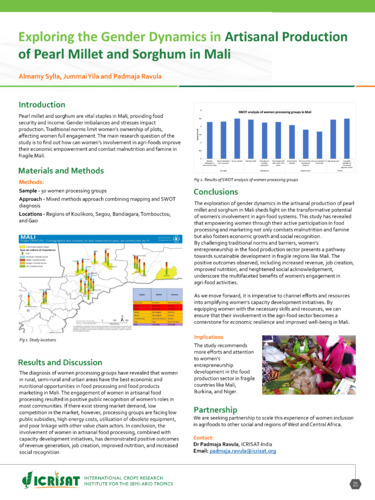Exploring the gender dynamics in artisanal production of pearl millet and sorghum in Mali
Abstract
Pearl millet and sorghum are crucial staple crops in Mali, providing food security, nutrition, and income for both men and women. However, gender imbalances and various biotic and abiotic stresses affect their production and use. Traditionally, only older women who have reached menopause and are relieved of other family responsibilities, are allowed to own pearl millet or sorghum plots due to social norms determining who can use the harvest and how, and the desire to maintain family unity. The main research question of the study is to find out how can women’s involvement in agri-foods improve their economic empowerment and combat malnutrition and famine in fragile Mali. The present study provides insights into the gendered roles in millet production and utilization, and the current dynamics of agri-food systems in Mali valuing women’s social and economic capacities using a mixedmethods approach and a strengths, weaknesses, opportunities and threats (SWOT) diagnosis. The diagnosis of women processing groups revealed that women in rural, semirural and urban areas have the best economic and nutritional opportunities in food processing and food products marketing in Mali. The engagement of women in artisanal food processing resulted in positive public recognition of women’s roles in most communities. In conclusion, the involvement of women in artisanal food processing, combined with capacity development initiatives, has demonstrated positive outcomes of revenue generation, job creation, improved nutrition, and increased social recognition. The study recommends more efforts and attention to women’s entrepreneurship development in the food production sector in fragile countries like Mali.

